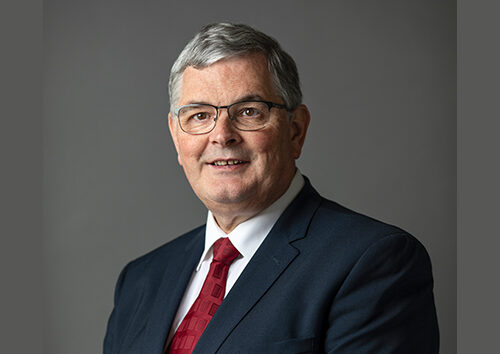22 February 2018 | Binfield, UK [Michael Pearson/tedNEWS] The Scottish poet, Robert Burns, wrote of ‘seeing ourselves as others see us’, but sometimes it is helpful to see and try to understand others through their own eyes. That kind of thinking led to Julie Siddiqi presenting the Newbold Diversity Centre lecture on Tuesday, 13 February, ‘Being a Muslim Woman in the UK: A Perspective’.
 A Newbold student focus group had asked for more lectures on the question of identity. Maybe, they suggested, Adventists can learn something from another group’s struggle with identity issues.
A Newbold student focus group had asked for more lectures on the question of identity. Maybe, they suggested, Adventists can learn something from another group’s struggle with identity issues.
Siddiqi is a well-known broadcaster and writer, and former Director of the Muslim Society of Great Britain. Born and bred in Surrey, she is a white British convert.
Siddiqi started by emphasizing that she was simply reporting her own experience including an openness and transparency about her own struggles with identity issues. She shared that Muslims in the UK are so different from each other because they come from different parts of the world, thus they are not one, unified, organised voice. As such, in her opinion, it really does not make sense to talk about ‘the Muslim community’. She equally spoke of her anguish when, after the first reports came through of the Manchester Arena atrocity, her young son asked her, ‘Was it a Muslim?’
 During the evening, participants heard some interesting facts about Islam in the UK. The first purpose-built mosque was erected, surprisingly enough, in 1889, at Woking in Surrey. Now, there are approximately 1,500 mosques in this country, many of them small. About one third of these mosques have no designated place for women to be during Friday prayers, a situation Siddiqi described as unacceptable.
During the evening, participants heard some interesting facts about Islam in the UK. The first purpose-built mosque was erected, surprisingly enough, in 1889, at Woking in Surrey. Now, there are approximately 1,500 mosques in this country, many of them small. About one third of these mosques have no designated place for women to be during Friday prayers, a situation Siddiqi described as unacceptable.
The Muslim population in the UK is currently 2 million, 4.8% of the national population. This is much less than people generally imagine. Of this number, over 50% are under the age of 25, which poses internal problems. Siddiqi dislikes the epithet, ‘non-Muslim’ but she did point out that over 90% of the non-Muslim population of the UK has never set foot inside a mosque.
Celebrity Muslims like Olympian Mo Farah and Bake Off winner Nadia Hussain do help to reduce prejudice but, according to Siddiqi, small local initiatives are the main key. Muslims regularly give a percentage of their income to charity and were prominent helpers in the aftermath of the Grenfell Tower fire in London.
Siddiqi has been involved in organizing various initiatives to help create understanding between different sections of the UK population. In a lifetime devoted to community activism, she has helped to rally Muslim, Christian and Jewish women to form a human chain of silent witness across Westminster Bridge in March 2017 after a Muslim man had wreaked havoc at the location just days before. She has inspired the ‘Open My Mosque’ movement and, during Ramadan, organised the ‘The Big Iftar’, open to all comers. ‘Sadaqa Day’ raised £100m for charity at the end of Ramadan. Most significant however are the local clean-ups, food banks and homeless shelters.
S iddiqi did not attempt to gloss over the awful atrocities perpetrated by Muslims in the UK and abroad. She clearly feels both anguish and shame about them and particularly worries about her four children as they try to make sense of Islam. She is seeking to create greater understanding of difference so that the violent actions – usually of young men – can be countered. This she does most usually with women of varied faiths and none.
iddiqi did not attempt to gloss over the awful atrocities perpetrated by Muslims in the UK and abroad. She clearly feels both anguish and shame about them and particularly worries about her four children as they try to make sense of Islam. She is seeking to create greater understanding of difference so that the violent actions – usually of young men – can be countered. This she does most usually with women of varied faiths and none.
Siddiqi sees many of the problems associated with Islam as being a piece of a much larger profound social problem. Islamist terror attacks resemble the latest massacre in an American school or gang-land violence. Safeguarding is just as much an issue in Oxfam as it is in Muslim communities. Any subjugation of Muslim women is part of the larger problem of violence against women highlighted in the ‘#MeToo’ campaign. Siddiqi’s message was that Muslim women are seeking to counter awful things done in the name of God by a dangerous, small minority of Muslim men. The evening left many questions unanswered but an open conversation between one Muslim woman and an audience of very diverse people can only help in the struggle to make our society a safer place for our children.
The full lecture can be seen on the Newbold College of Higher Education Facebook page. [tedNEWS]
tedNEWS Staff: Victor Hulbert, editor; Sajitha Forde-Ralph, associate editor
119 St Peter’s Street, St Albans, Herts, AL1 3EY, England
E-mail: [email protected]
Website: www.ted.adventist.org
tedNEWS is an information bulletin issued by the communication department of the Seventh-day Adventist Church in the Trans-European Division.



